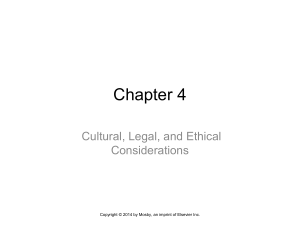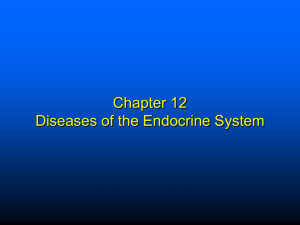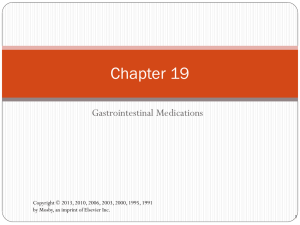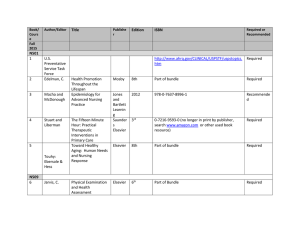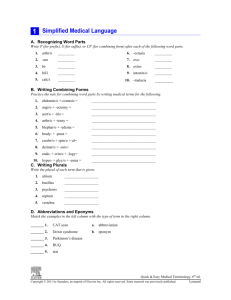Developmental Processes
advertisement
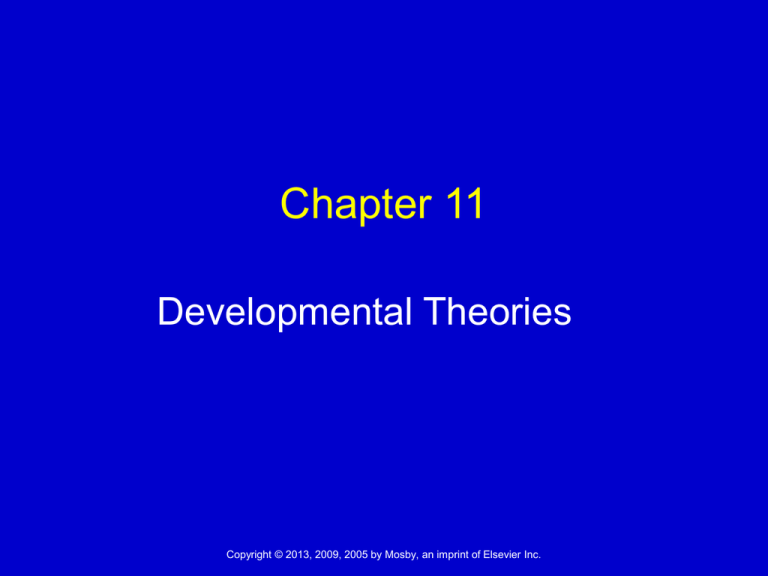
Chapter 11 Developmental Theories Copyright © 2013, 2009, 2005 by Mosby, an imprint of Elsevier Inc. Developmental Theories Propose ways to account for how and why people grow as they do. Provide a framework for examining, describing, and appreciating human development. Help nurses assess and treat a patient’s response to illness. Copyright © 2013, 2009, 2005 by Mosby, an imprint of Elsevier Inc. 2 Growth and Development Growth encompasses the physical changes across a person’s life span. Development: A progressive and continuous process of change Begins at conception Continues throughout a lifetime Copyright © 2013, 2009, 2005 by Mosby, an imprint of Elsevier Inc. 3 Developmental Processes Biological processes Cognitive processes Physical growth and development Intelligence, understanding, thinking Socioemotional factors Personality, emotions, relationships with others Copyright © 2013, 2009, 2005 by Mosby, an imprint of Elsevier Inc. 4 Biophysical Developmental Theories Examine how bodies grow and change Gesell’s theory of development Growth and development is unique and is directed by gene activity. Maturation follows a fixed developmental sequence Human growth: • Cephalocaudal • Proximodistal Copyright © 2013, 2009, 2005 by Mosby, an imprint of Elsevier Inc. 5 Psychoanalytical/Psychosocial Theories Describe development from personality, cognitive, and behavioral perspectives Explain development as primarily unconscious and influenced by emotion Psychoanalytical theorists maintain that these unconscious drives influence development through universal stages experienced by all individuals. Copyright © 2013, 2009, 2005 by Mosby, an imprint of Elsevier Inc. 6 Psychoanalytical/Psychosocial Theories: Freud Sigmund Freud believed that the human personality consists of id, ego, and superego. These components develop in stages and regulate behavior. He identified five stages of development: Stage 1: Oral (birth to 12 to 18 months) Stage 2: Anal (12 to 18 months to 3 years) Stage 3: Phallic or Oedipal (3 to 6 years) Stage 4: Latency (6 to 12 years) Stage 5: Genital (puberty through adulthood) Copyright © 2013, 2009, 2005 by Mosby, an imprint of Elsevier Inc. 7 Erikson’s Psychosocial Stages Stage 1: Trust versus mistrust (birth to 1 year) Stage 2: Autonomy versus shame and doubt (1 to 3 years) Stage 3: Initiative versus guilt (3 to 6 years) Stage 4: Industry versus inferiority (6 to 11 years) Stage 5: Identify versus role confusion (puberty) Stage 6: Intimacy versus isolation (young adult) Stage 7: Generative versus self-absorption and stagnation (middle age) Stage 8: Integrity versus despair (old age) Copyright © 2013, 2009, 2005 by Mosby, an imprint of Elsevier Inc. 8 Case Study Ahmad is learning about Freud’s developmental theories. Rank in their correct order the following stages of psychosocial development as determined in Freud’s psychoanalytical model of personality development: • Genital • Anal • Oral • Phallic • Latency Copyright © 2013, 2009, 2005 by Mosby, an imprint of Elsevier Inc. 9 Case Study (cont’d) Ahmad is studying Gesell’s theory of development. True or False: According to Gesell’s theory of development, each child’s pattern of growth is a result of environmental influences. Copyright © 2013, 2009, 2005 by Mosby, an imprint of Elsevier Inc. 10 Theories Related to Temperament Temperament is a behavioral style or pattern that affects an individual’s emotional interactions with others. Chess and Thomas identified three basic childhood temperaments: The easy child (easy going and predictable) The difficult child (irritable and irregular) The slow-to-warm-up child (adapts slowly) Copyright © 2013, 2009, 2005 by Mosby, an imprint of Elsevier Inc. 11 Perspectives on Adult Development Life span perspective: Human development is lifelong, although changes are slower Stage-crisis theory (Havinghurst) focuses on resolution of tasks: • Owing to physical maturation • From personal values • From societal pressures Activity theory of older adulthood Developmental crisis Copyright © 2013, 2009, 2005 by Mosby, an imprint of Elsevier Inc. 12 Perspectives on Adult Development (cont’d) Contemporary life events approach Takes individual variations into account Selective optimization with compensation theory states that as individuals age, they are able to compensate for some decreases in physical or cognitive performance by developing new approaches. Copyright © 2013, 2009, 2005 by Mosby, an imprint of Elsevier Inc. 13 Perspectives on Adult Development (cont’d) Socioemotional selectivity theory states that as people age, they become more selective and invest their energies in meaningful pursuits. Copyright © 2013, 2009, 2005 by Mosby, an imprint of Elsevier Inc. 14 Cognitive Developmental Theories Jean Piaget’s four stages: Period I: Sensorimotor (birth to 2 years) Period II: Preoperational (2 to 7 years) Period III: Concrete operations (7 to 11 years) Period IV: Formal operations (11 years to adulthood) Copyright © 2013, 2009, 2005 by Mosby, an imprint of Elsevier Inc. 15 Cognitive Developmental Theories (cont’d) Postformal thought (a fifth stage) Continued cognitive development involves increasing cognitive flexibility. Adults change how they use knowledge, and the emphasis shifts from attaining knowledge or skills to using knowledge for goal achievement. Assessment of cognitive ability becomes critical as the nurse engages in health care teaching for patients and families. Copyright © 2013, 2009, 2005 by Mosby, an imprint of Elsevier Inc. 16 Case Study (cont’d) Ahmad is learning that psychoanalytical theorists varied greatly in their perceptions related to development. Which psychoanalytical theorist believed that development occurred throughout the life span and focused on psychosocial stages? • Piaget • Freud • Erikson • Chess Copyright © 2013, 2009, 2005 by Mosby, an imprint of Elsevier Inc. 17 Moral Developmental Theory Attempts to define how moral reasoning matures for an individual Refers to changes in a person’s thoughts, emotions, and behaviors that influence the perception of right or wrong Kohlberg’s moral developmental theory Moral reasoning develops in stages. Six stages in three levels Copyright © 2013, 2009, 2005 by Mosby, an imprint of Elsevier Inc. 18 Kohlberg’s Moral Developmental Theory Level I: Preconventional reasoning, when children ask WHY. Stage 1 = Punishment and Obedience Orientation: Children view illness as a punishment. Stage 2 = Instrumental Relativist Orientation Level II: Conventional reasoning, when moral reasoning is based on internalization of societal and others’ expectations Stage 3 = Good Boy-Nice Girl Orientation Stage 4 = Society-Maintaining Orientation Copyright © 2013, 2009, 2005 by Mosby, an imprint of Elsevier Inc. 19 Kohlberg’s Moral Developmental Theory (cont’d) Level III: Postconventional reasoning occurs when a person finds a balance between basic human rights and obligations and societal rules and regulations. Stage 5 = Social Contract Orientation Stage 6 = Universal Ethical Principle Orientation, where right is defined by the decision of conscience in accord with self-chosen ethical principles. Copyright © 2013, 2009, 2005 by Mosby, an imprint of Elsevier Inc. 20 Moral Reasoning and Nursing Practice Nurses need to identify their own moral reasoning. Nurses need to recognize the level of moral reasoning used by other health care team members. Nurses need to separate their own beliefs when helping patients with their moral decision-making process. Copyright © 2013, 2009, 2005 by Mosby, an imprint of Elsevier Inc. 21 Quick Quiz! 1. According to Kohlberg, moral development is a component of psychosocial development. Moral development depends on the child’s ability to integrate A. Modeling of others. B. Faith and optimism. C. Self-control and independence. D. Decisions of right and wrong. Copyright © 2013, 2009, 2005 by Mosby, an imprint of Elsevier Inc. 22 Perspectives No one theory can describe how people grow and develop. Developmental theories help nurses to use critical thinking skills. Examples of nursing diagnoses applicable to patients with developmental problems include: Risk for delayed development Delayed growth and development Risk for disproportionate growth Copyright © 2013, 2009, 2005 by Mosby, an imprint of Elsevier Inc. 23
